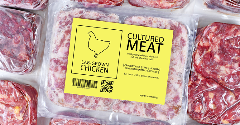News
Singapore becomes first country to approve lab-grown meat
4 Jan 2021The Singapore Food Agency, the city state’s regulatory body for food, approved San Francisco startup Eat Just’s cell-based meat chicken product, paving the way for its sale in the country.
Eat Just’s cultured chicken will initially be used in chicken nuggets, according to The BBC, but there is no timeline on when the product will be released. However, the company said that when it debuts its chicken nuggets they will retail for a price that is comparable to premium conventional chicken products. Last year, the same chicken nuggets would have sold for $50 a piece.

Singapore found that cultured meat is safe for consumption, however, Eat Just went further with the number of accolades that it attributed to cell-cultured chicken, pointing out in a release that its lab-grown chicken had a lower microbiological content than conventional chicken and that its chicken was grown using no antibiotics.
But Singapore is not the only country in which Eat Just is working toward regulatory approval. Food Dive reported that the cell-based meat company is striving for approval in the U.S. as well as one other location that remains undisclosed. In addition to seeking additional approvals for its chicken products, the company is also developing other products that are both cell-based and plant-based.
In 2020, Eat Just received funding to manufacture its mung bean Just Egg product in Singapore. It is also working to produce cultured wagyu beef with the Japanese meat producer Toriyama. Food Dive reported that the company will present a culture beef line as the next product for regulatory approval.
Unlike plant-based meat substitutes, cultured or cell-based meat is a lab-grown product derived from real animal cells. Although the product is not vegetarian – the cells are taken from live chickens – manufacturers are looking to appeal to this demographic since this method of meat production does not entail killing animals. At the same time, another major demographic that cultured meat manufactures are looking to appeal to are carnivores.
Meat eaters and flexitarians – those who choose to occasionally consume a plant-based diet – are a major component driving the growth of meat alternatives, a category that the investment firm UBS forecasts to rise from $4.6 billion in 2018 to $85 billion in 2030. A primary reason for this astronomical growth is due to the health associations of meat alternatives. Fifty-two percent of U.S. consumers are eating more plant-based foods because it makes them feel healthier, per a study from DuPont Nutrition & Health found. Cell-based meat, however, is having a more difficult time taking off.
A 2019 poll from marketing firm Charleston|Orwig found that 40% of consumers found lab-created food to be “scary.” Nevertheless, a more recent report from the consulting firm Kearney anticipates that 35% of all meat consumed worldwide will be cell-based by 2040. With opinions on the subject evolving and companies making headway in terms of regulatory approvals, it is unlikely that the development of these cell-based alternatives will slow down. Instead, production is likely to increase, and the proliferation of these options may even result in changing opinions in regards to their appeal.
Related news

‘Health’ labels on products reduce consumers’ willingness to pay
10 Mar 2025
A study into front-of-packaging “health” labelling finds that these labels alone can lower US consumers’ willingness to pay.
Read more
Food industry lags on healthier product formulation, nutrition index finds
7 Mar 2025
The world’s biggest food manufacturers derive just 34% of their sales from healthier products, according to the 2024 Global Access to Nutrition Index.
Read more
Does calorie labelling lead to reduced consumption?
27 Feb 2025
Calorie labelling of food products leads to a small, but consistent, reduction in the number of calories consumed, a study suggests.
Read more
F&B industry hit with fresh greenwashing claims
26 Feb 2025
The food and beverage (F&B) industry is under fresh scrutiny amid claims of greenwashing, with Arla the latest company in the firing line.
Read more
Have scientists discovered a new tool to measure UPFs?
19 Feb 2025
Researchers have developed a new scoring system and database, compiling over 50,000 food items, of which over 1,000 are classified as ultra-processed.
Read more
Singapore explores farmland-free food production
17 Feb 2025
Researchers discover new technology replicating on-farm food production conditions from within the indoor lab environment.
Read more
Most consumers lack trust in AI, but supplement users are ready to embrace the technology
14 Feb 2025
A survey of UK and US consumers found that most supplement users are willing to let AI make decisions on their behalf, but they also demand greater transparency.
Read more
Indians enjoy first bites of cultivated chicken
13 Feb 2025
The first public tasting of cultivated meat in India has taken place as the country prepares for the first commercial cultivated meat products – potentially as early as the end of this year.
Read more
Disruptor brands spearhead sustainable solutions
11 Feb 2025
Manufacturers, big and small, sharpen their focus by providing sustainable products and services centred on comprehensive and sustainable approaches to traditional methods.
Read more
The future of UPF regulation: Stricter labelling, more taxation, and no more conflicts of interest?
10 Feb 2025
Policymakers are intensifying efforts to regulate ultra-processed foods (UPFs), as mounting evidence links their consumption to increased risks of obesity, cardiovascular disease, and other chronic health issues.
Read more